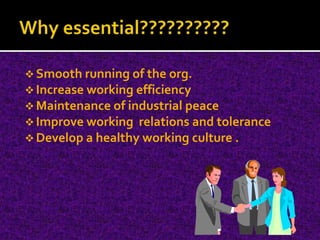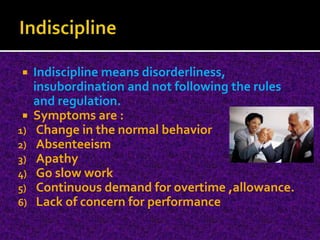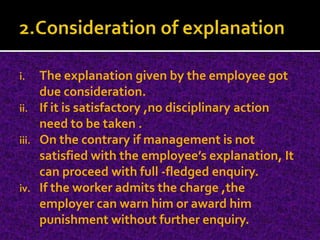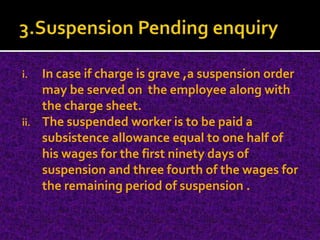Discipline and grievance
- 2. “Discipline is the force that prompts individuals or groups to observe rules, regulations, standards and procedures deemed necessary for an organization.” Discipline is the orderly conduct of affair by the members of an organization. Orderly behavior is possible when the employees follow the company policies strictly as laid down by its rules and regulations.
- 3. 1. Self discipline 2. The necessary condition for orderly behaviors in an organization 3. The punishment is a preventive step for he reoccurrence of offence.
- 4. Smooth running of the org. Increase working efficiency Maintenance of industrial peace Improve working relations and tolerance Develop a healthy working culture .
- 5. Positive Negative 1. Positive – It involves creation of an atmosphere in the organization whereby employees willingly conform to the established rules and regulations. It can be achieved through rewards and effective leadership. 2. Negative- Penalties are used to force the workers to obey rules and regulations.
- 6. 1. Unfair management practices. 2. Absence of effective leadership 3. Communication barriers 4. Non uniform disciplinary action 5. Inadequate attention to personnel policies 6. Unequal treatment 7. Absence of code conduct
- 8. Indiscipline means disorderliness, insubordination and not following the rules and regulation. Symptoms are : 1) Change in the normal behavior 2) Absenteeism 3) Apathy 4) Go slow work 5) Continuous demand for overtime ,allowance. 6) Lack of concern for performance
- 9. Misconduct is violation of established rules and procedures. It is a serious form of indiscipline. For e.g. 1) Does not discharge his duties properly, remain absent without leave 2) Indulge in acts which are unsafe for the employees 3) Insulting others ,abusive and disturbs the peace of others 4) Unfaithful ,corrupt, disloyal 5) Indulge in theft, fruad,bribery 6) Resort to illegal strikes 7) Cause willful damage to property.
- 10. 1.Oral warning- he may be given a oral reprimand by his immediate supervisor. 2.Written warning- Whenever oral warning fails to achieve the desired behavior on part of employee written warnings are given.They are also called as PINK SLIP 3.Loss of privileges- like he may not be allowed to select good tools and machines for himself and to move freely in the company. 4.Fine- Monetary punishment
- 11. 5.Withholding increments- given for major offences or act of misconduct of very serious nature 6.Demotion- shifting an employee to lower grade from his presents position. 7.Discharge- removal of an employee from his job .it may or not be part of punishment .a person may be discharged if his work and conduct is not up to mark. 8.Dismissal- most serious form punishment or it is the maximum punishment given to an employee. the person loses his job in the organization and is not fit for the reemployment again.
- 12. 1. Corrective not punitive 2. Progressive actions and punishments 3. Red Hot stove rules- i. Immediate response ii. Adequate warning iii. Consistent iv. impersonal
- 13. Issue of a charge Sheet 1. Consideration of explanation 2. Suspension Pending enquiry 3. Holding of Enquiry 4 Order of Punishment 5.
- 14. i. Management should proceed to issues a charge sheet to the employee. ii. Charge sheet is merely a notice of the charge and provides the employee an opportunity to explain his conduct. iii. Charge sheet is generally known as show cause notice.
- 15. i. The explanation given by the employee got due consideration. ii. If it is satisfactory ,no disciplinary action need to be taken . iii. On the contrary if management is not satisfied with the employee’s explanation, It can proceed with full -fledged enquiry. iv. If the worker admits the charge ,the employer can warn him or award him punishment without further enquiry.
- 16. i. In case if charge is grave ,a suspension order may be served on the employee along with the charge sheet. ii. The suspended worker is to be paid a subsistence allowance equal to one half of his wages for the first ninety days of suspension and three fourth of the wages for the remaining period of suspension .
- 17. i. An enquiry officer should be appointed to hold the enquiry and notice to this effect should be given to the concerned worker . ii. The enquiry officer should give sufficient notice to the worker so that he may prepare submission in his defence. iii. The enquiry officer should proceed in a proper manner and examine witnesses. iv. On the conclusion of the enquiry officer should records his findings and reason thereof. v. He should refrain recommending punishment and leave it to the decision of appropriate authority.
- 18. i. Disciplinary action can be taken when the misconduct of the employee is proved. ii. While deciding the nature of disciplinary action, the employee’s previous record, precedent, effect of the action on the other employees etc. have to be considered. iii. When the employee feels that the enquiry conducted was not proper and the action taken unjustified ,he must be given a chance to make appeal.

















